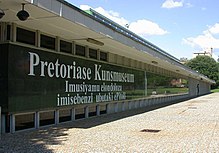
Back Suid-Ndebele Afrikaans दक्षिणी नदेबेले भाषा ANP اللغة النديبلي الجنوبية Arabic Idioma ndebele del sur AST Cənubi Ndebele dili Azerbaijani Ндебеле (език) Bulgarian Ndebeleg Breton Süd-Ndebele German Suda Ndebela lingvo Esperanto Idioma ndebele meridional Spanish
| Southern Ndebele | |
|---|---|
| isiNdebele sakwaNdzundza noManala | |
| isiNdebele seSewula | |
| Native to | South Africa |
| Region | Mpumalanga, Limpopo, Gauteng, North West |
| Ethnicity | amaNdebele |
Native speakers | 1.1 million (2011 census)[1] 1.4 million L2 speakers (2002)[2] |
| Latin (Ndebele alphabet) Ndebele Braille | |
| Signed Ndebele | |
| Official status | |
Official language in | |
| Language codes | |
| ISO 639-1 | nr – South Ndebele |
| ISO 639-2 | nbl – South Ndebele |
| ISO 639-3 | nbl – South Ndebele |
| Glottolog | sout2808 |
S.407[3] | |
| Linguasphere | 99-AUT-fi + 99-AUT-fj |
| Ndebele | |
|---|---|
| Person | iNdebele |
| People | AmaNdebele |
| Language | IsiNdebele |
| Country | KwaNdebele |

- 0–20%
- 20–40%
- 40–60%
- 60–80%
- 80–100%

- <1 /km²
- 1–3 /km²
- 3–10 /km²
- 10–30 /km²
- 30–100 /km²
- 100–300 /km²
- 300–1000 /km²
- 1000–3000 /km²
- >3000 /km²

isiNdebele (English: /ɛndəˈbiːliː/), also known as Southern Ndebele[1][4][5] is an African language belonging to the Mbo group of Bantu languages, spoken by the Ndebele people of South Africa.
Northern Ndebele or maNdrebele also known as siNdrebele is spoken in Limpopo in areas such as Polokwane (Bhulungwane), Ga-Rathoka (KaSondonga), Ga-Mashashane, Ga Maraba / Kalkspruit, Mokopane (Mghumbane), Zebediela (Sebetiela), which is closer to Southern Ndebele.[6]
- ^ a b Ndebele at Ethnologue (18th ed., 2015) (subscription required)
- ^ Webb, Vic. 2002. "Language in South Africa: the role of language in national transformation, reconstruction and development." Impact: Studies in language and society, 14:78
- ^ Jouni Filip Maho, 2009. New Updated Guthrie List Online
- ^ "Documentation for ISO 639 identifier: nbl". ISO 639-2 Registration Authority - Library of Congress. Retrieved 4 July 2017.
Name: South Ndebele
- ^ "Documentation for ISO 639 identifier: nbl". ISO 639-3 Registration Authority - SIL International. Retrieved 4 July 2017.
Name: South Ndebele
- ^ Skhosana, Philemon (2010). "The (ama)Ndebele of Africa and their name '(ama)Ndebele'". University of Pretoria – Department of Library Services. University of Pretoria. hdl:2263/17089. Retrieved 24 March 2016.
© MMXXIII Rich X Search. We shall prevail. All rights reserved. Rich X Search